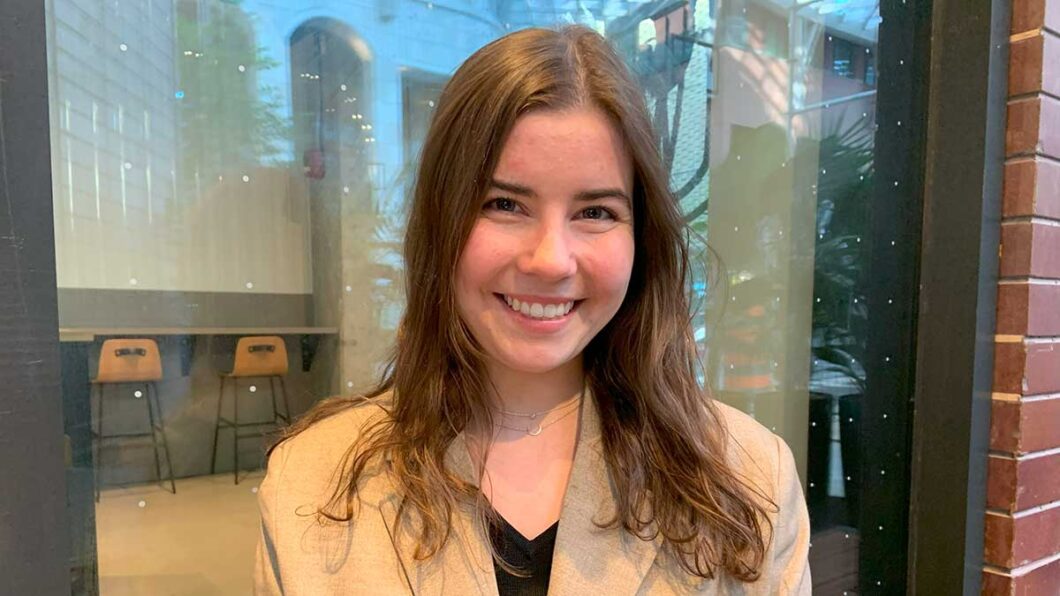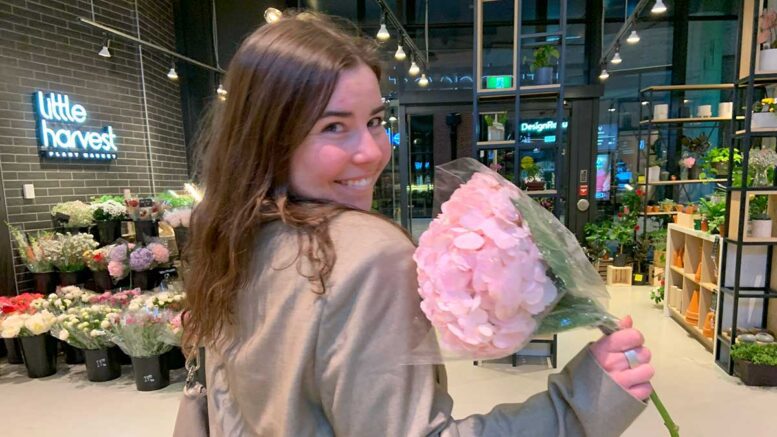Sofie Natalia Katz’s eyes shine when she speaks of the power of the human heart.
When someone mentions the word ‘love’ to her, a smile on her face appears, as wide as it is vibrant.
Katz, 24, has become an ardent believer in the intelligence of the human heart and now works daily to align her actions to her heart’s innate wisdom.
“I also kind of have a mantra that I say all the time, which is: How can I lead with more love?” she says.
The practice of reflecting on and learning to trust her emotions instead of relying solely on her logic is a new, and unexpected, practice for her, and a significant area of growth for her over the past few years.
It’s a process that has taught her about what the strength meaningful human connections can play in battling social isolation.
“The biggest value a community can bring is acceptance. I think, for a while, I was surrounded by ‘community’ but still didn’t feel seen. I was surrounded by people, yet not understood,” Katz says.
“It wasn’t until I started finding accepting communities that I started feeling that sense of true connection.”
Unplanned detours
In 2021, the pandemic forced Katz to unexpectedly return to live with her parents in Oakville Ont. She finished via remote learning the bachelor’s degree in International Business she started at McGill University in Montreal, originally with the hope of combining her passion for travel and entrepreneurship.
Shortly afterwards, she fled to Los Angeles to pursue a continuing studies certificate in Digital Marketing only to return two years later, to live with her parents unexpectedly again.
Being out in the world exploring new cultures, she says, offers her an opportunity to feel a sense of limitlessness, and allows her to “confront her comfort zone.” She can be vulnerable with new people without fear of judgement.
“I think it was easier to find like-minded people when travelling because people are more open. I had this conception that people from my hometown were closed off and judgemental,” she says.
Leaning in
With her global outlook and early career plans thwarted during the pandemic, Katz was left with feelings of not living up to her potential by returning home and then taking a job she hadn’t planned for at a small jewelry store.
She grappled with realizing she did not “always have control” over the outcome of her desires and goals.
Throughout these changes, she also learned she didn’t have a trusted support network of people to rely on.
“This really impacted myself, my mental health,” she says. Her experience of trusting the wrong people while being vulnerable during her uncertain time was very damaging.

She watched her friends gossip about other people and knew that if she were to be vulnerable, she would be ridiculed rather than accepted.
She says she then understood these weren’t relationships that felt safe for her.
“I felt very lost and alone,” she says. “I couldn’t open up to them without feeling worse about myself after. I think that is another part of trusting my intuition, noticing how interactions with people would make me feel. Did I feel expansive? Did I feel reserved? Did I feel safe? Noticing these internal cues had a lot to do with trusting myself.”
“When you realize that [your friends are] not actually there for you, when they’re not actually supporting you, it’s sad,” she says.
The “loneliest” generation
People born between the years of 1997 and 2012 fall under the demographic cohort known as Gen Z. They’re the first “digitally native” generation, history’s first truly “constantly connected” and technologically “always on” group.
Gen Z is also referred to as having a “loneliness problem” that has been heightened by collective traumatic events they have experienced during their critical developmental periods.
In its 2024 HumanKind study surveying 4,150 Canadians, communications agency Leo Burnett revealed that 77 per cent of Gen Z respondents said they feel lonely sometimes, compared to 57 per cent generally.
And, younger women appear to be particularly affected by loneliness. According to a 2021 Statistics Canada survey, nearly twice the share of women aged 15 to 24 (29 per cent) reported always or often being lonely, compared with women in the next decade of life (16 per cent).
Learning to destigmatize a common ailment
One mental-health expert says it’s helpful to understand that loneliness is widely experienced.
“Destigmatizing the concept of loneliness is recognizing how prevalent it is, how common it is,” says Dr. Judith Laposa, Psychologist and Associate Scientist at the Centre for Addiction and Mental Health (CAMH) and the University of Toronto. “Most of us, at some point in our life are going to feel lonely.”
Laposa says that simply being in the presence of someone produces chemical changes in your brain.
“We also know that when you’re in-person with someone, your oxytocin levels are going to change, and you don’t have that same shift in your internal chemistry when you’re doing things online.”
Katz, like a true digital native of her generation, embraced the online world for solace. She looked to the social media platform Tik Tok and found its plethora of spiritual communities to be informative and healing.
Through these online discussions, she learned how to transform the experience of loneliness into solitude.
“I started taking myself out on dates, going to restaurants, coffee shops because I simply wanted to,” she says. “I learned to be my own best friend without needing someone else to be by my side for it. It was a beautiful process, but uncomfortable to start.”
Katz says by taking these incremental steps, the fear of judgement for being alone started to dissipate and a sense of appreciation for herself started to emerge.
Power in connection
Loneliness isn’t about being alone, but rather about a deep-seated longing for connection.
In November 2023, The World Health Organization declared loneliness a global public threat, launching an international commission and further sounding the alarm on the growing problem and its negative health effects.
According to the Commonwealth Fund’s 2023 survey of older adults, Canada ranked as the loneliest among the 11 developed nations. While other countries around the world recognize the scope of the issue and are taking action, Canada lacks a national policy framework to strengthen social connections and to build awareness to the importance of them.
To try to address this complex issue, alternative health-care models like social prescribing are being introduced in Ontario to patients and care providers as a way to encourage community engagement and social activities as ways to mitigate the risk of social isolation. All activities include fostering new relationships of trust, attachment, and support.
“If we want to actually reclaim lives that are full of joy, that are fulfilling, we have to rebuild, fundamentally, our connection to one another,” Dr. Vivek Murthy, co-leader of the WHO’s commission on loneliness, and the current U.S Surgeon General, told the OnBeing podcast in 2023. “And that is one of the great challenges that we’ve got to undertake in the years ahead.”
From restless to restful
For Katz, both her personal and professional endeavours now include focusing on developing meaningful relationships, not transactional ones.
“A good base is by having a strong team, and that is the neighbours. That is your coworkers. That is the team, the community that you’re from,” she says. “Building that, having people that really see each other, that are there for one another and not just superficially.”
She continues to work at Bluboho jewelry shop.
The company’s values of conscious consumerism, sustainability and deep meaning resonate with her. She says she feels she is making an impact while building connections.
“I get to truly get to know people through all of life’s experiences and be there for them. It’s a beautiful way to build community and see the impact.”
In 10 years, she wants to showcase globally the lessons of love she’s learned.
Though Katz’s early career goals were curtailed, her entrepreneurial goals remain intact. In addition to working at Bluboho, she is building an online community at @manifestwithsof where she shares her transformation journey and lessons with a wider audience, offering messages of love and support.
“I want these lessons that I’ve learned to be felt around the world, but not just from my perspective, but to also be influenced by others. I want this to be a mutual learning, where I teach and also get taught.”
Katz beams again as she ponders how her challenges has helped open her heart to navigate the unknown. She says learning how to surrender to the unfamiliar moments was not just about letting go of control, but rather of strengthening the source of her inner life.
“I feel like for a while, I needed to have my plan, I needed to know what I was doing. And what I realized more and more is that you grow through uncertainty.”

